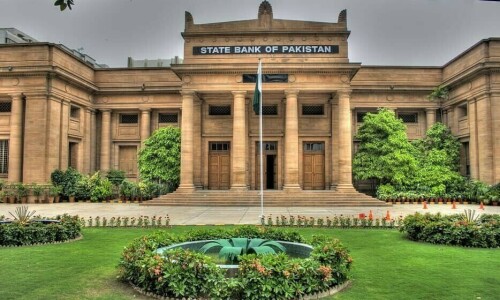The State Bank of Pakistan (SBP) on Monday chose to maintain the status quo by upholding the key policy rate at 22 per cent for the seventh policy meeting in a row.
The announcement came after a meeting of the bank’s Monetary Policy Committee (MPC).
In a statement, the MPC said that the continuation of the current monetary policy stance, with significant positive real interest rates, was necessary “to bring inflation down to the target range of 5-7pc by September 2025”.
Giving its reasoning, the MPC noted that global commodity prices appeared to have bottomed out with “resilient global growth”, recent geopolitical events had also added uncertainty about their outlook and the upcoming budgetary measures may have implications for the near-term inflation outlook.
It said it viewed the level of inflation to still be high, albeit it did expect inflation to continue to remain on a downward trajectory.
The MPC said that in line with its expectations, inflation continued to “moderate noticeably” in the second half of the current fiscal year as headline inflation in March declined to 20.7pc year on year 23.1pc in February while core inflation “fell significantly” to 15.7pc from 18.1pc in February.
“Besides the coordinated tight monetary and fiscal policy response, other factors that have led to this favorable outcome include lower global commodity prices, improved food supplies and high base effect.”
On a positive note, the MPC highlighted that “macroeconomic stabilisation measures are contributing to considerable improvement in both inflation and external position, amidst moderate economic recovery”.
It said economic activity was recovering at a “moderate pace”, led by a “strong rebound” in the agriculture sector.
“Secondly, the current account recorded a sizeable surplus in March 2024, which helped to stabilise the SBP’s foreign exchange reserves despite substantial debt repayments and weak financial inflows,” it said.
Moreover, the MPC observed that that the policy aligned with other leading central banks, particularly in advanced economies, who had adopted a “cautious policy stance after noticing some slowdown in the pace of disinflation in recent months”.
Overall, the statement read that the committee deemed it “prudent” to maintain the policy rate unchanged due to the inflation outlook being “susceptible to risks” emanating from the recent global oil price volatility along with bottoming out of other commodity prices, the potential inflationary impact of resolution of circular debt in the energy sector and tax rate-driven fiscal consolidation going forward.
Last month, the committee had chosen to maintain the status quo by upholding the key policy rate at 22pc for the sixth policy meeting in a row.
Today’s decision also comes ahead of the country nearing its completion of a $3 billion standby arrangement (SBA) it secured from the International Monetary Fund (IMF) last year. The IMF Executive Board is expected to meet later today to decide on the final tranche of $1.1bn.













































Dear visitor, the comments section is undergoing an overhaul and will return soon.